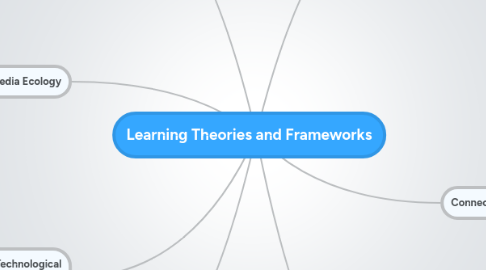
1. SCOT (Social Construction of Technology)
1.1. Principles:
1.1.1. Technology does not determine human action but that human action shapes technology
1.2. Implications in Education:
1.2.1. The learner decides what part of technology is useful and meaningful.
1.2.2. Teachers should encourage students to choose how they learn through technology
2. Media Ecology
2.1. Principles:
2.1.1. Media and communication affect human's understanding, perceptions, and values
2.1.2. Hot media needs little involvement from audience
2.1.3. Cool media demands active involvement from audience
2.2. Implications in Education:
2.2.1. Teachers can use cool media to create active learning in their classroom
2.2.2. Teachers can use technology their students already use
3. TPACK (Technological Pedagogical Content Knowledge)
3.1. Principles:
3.1.1. Framework of knowledge needed by teachers to ensure technology enhanced learning
3.1.2. 3 types of knowledge: Technology, Pedagogy & Content
4. Philosophy of Teaching
4.1. Principles
4.1.1. A teachers personal opinion and thoughts about technology in their classroom
4.1.2. Similar to a Philosophy of Teaching
4.1.3. Philosophy can change and evolve with the growth of the teacher
5. Constructivism
5.1. Principles:
5.1.1. Learning is an active process
5.1.2. Learning is a social activity
5.1.3. Learning is in relationship to what we already know
5.1.4. Learning is about buliding on previous knowledge
5.2. Implications in Education:
5.2.1. Teachers are the facilitators and guide students to socially discuss problems, topics, and ideas
5.2.2. Teachers should create a collaborative environment
5.2.3. Teachers should encourage creativity
5.2.4. Teachers should pick authentic tasks
6. Connectivism
6.1. Principles:
6.1.1. Learning exists in the networks we build
6.1.2. Continual learning happens when you maintain connections
6.1.3. Its the learning theory for the digital age
6.1.4. Learning occurs in many different ways
6.2. Implications in Education:
6.2.1. Teachers help students feel comfortable using technology
6.2.2. Teachers should implement group work and class discussion
6.2.3. Teachers should encourage technology use in the classroom including cellphones, emails, and social networking sites
7. Cognitive Load
7.1. Principles:
7.1.1. Learning can overload or under load working memory
7.1.2. A learner has limited working memory but unlimited long term memory
7.2. Implications in Education:
7.2.1. Teachers can chunk material to help learns learn
7.2.2. teachers can use concept maps to help focus new information
